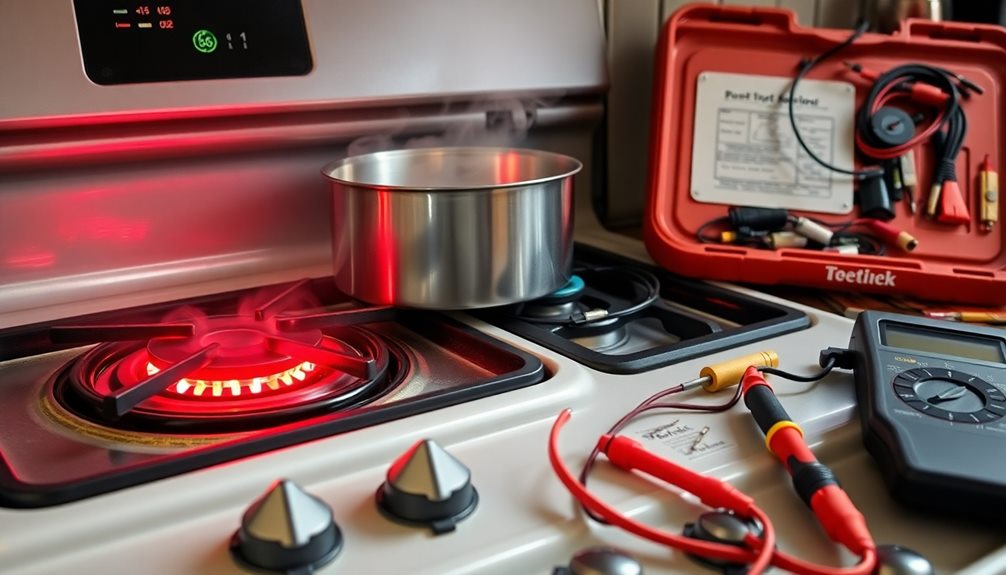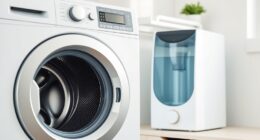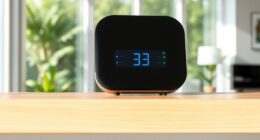To choose the right size water heater for your home, start with your household size. For 1-2 people, a 23-36 gallon tank should work. A family of four needs about 40 gallons, while larger households might require over 56 gallons. For tankless heaters, focus on the flow rate; you'll want a minimum of 3.25 GPM. Consider peak hot water usage times and the number of bathrooms in your home. Don't forget to evaluate space for installation. Making the right choice guarantees comfort and efficiency. Want to discover more tips for a perfect fit?
Key Takeaways
- Determine household size to estimate the appropriate tank capacity: 23-36 gallons for 1-2 people, 40 gallons for a family of four, and more for larger families.
- Assess peak hour demand by calculating simultaneous hot water usage to ensure the water heater meets the First Hour Rating (FHR) requirements.
- Evaluate space for installation; tank water heaters need more room compared to compact tankless models suitable for smaller areas.
- Consider fuel types like gas and electric; gas units heat water faster, while electric is more efficient for smaller households.
- Analyze hot water usage patterns to avoid oversizing; choose a heater that fits your needs without excess capacity for efficiency.
Types of Water Heaters
When it comes to choosing a water heater, understanding the different types available is vital for meeting your household's needs.
Tank water heaters are the most common option, offering capacities from 20 to 80 gallons to accommodate varying water demands. They store hot water, ready for use whenever you need it.
If you're looking for a more energy-efficient option, consider tankless water heaters. These units provide hot water on demand, eliminating the need for storage. With flow rates around 5 gallons per minute for gas models and 2 for electric ones, they're great for smaller households.
Additionally, exploring geothermal energy options can enhance your home's efficiency and sustainability.
For those who use less than 20 gallons daily, point of use water heaters are smaller units installed near specific fixtures, perfect for quick access.
If energy savings are a priority, hybrid water heaters combine traditional tank designs with heat pump technology, offering up to 75% energy savings.
Finally, don't overlook smart water heaters that connect to Wi-Fi, giving you advanced monitoring and control over your hot water usage, plus alerts for maintenance needs.
Choosing the right type will guarantee you meet your household's hot water requirements efficiently.
Key Factors to Consider
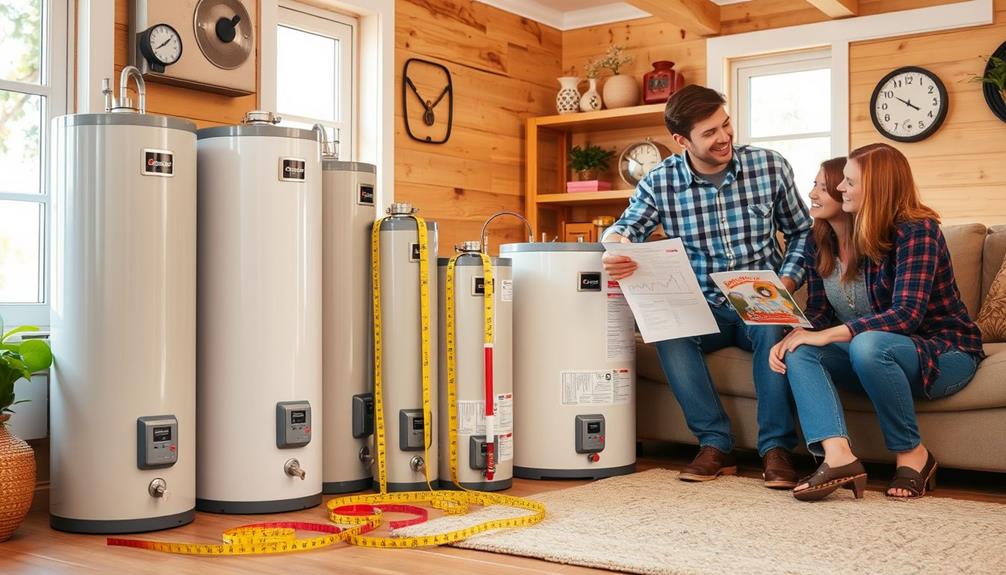
Selecting the right water heater involves several key factors that can considerably impact your home's efficiency and comfort. First, assess the number of occupants in your home. A general guideline suggests a 40-gallon tank water heater for an average family of four, while larger households may require over 56 gallons. Next, calculate your peak hour demand by summing the hot water needs of simultaneous fixtures, helping you determine the necessary First Hour Rating (FHR).
Here's a quick reference table to help visualize your requirements:
| Household Size | Recommended Water Heater Size | Estimated FHR |
|---|---|---|
| 1-2 | 30-40 gallons | 20-30 gallons |
| 3-4 | 40-50 gallons | 30-40 gallons |
| 5-6 | 50-60 gallons | 40-50 gallons |
| 7+ | 60+ gallons | 50+ gallons |
Also, consider your existing space for installation. Tank water heaters require more room, while tankless models can fit in smaller areas. Finally, factor in your household's hot water usage patterns to guarantee your selected water heater size meets both daily and peak demands effectively.
Sizing for Tank Water Heaters

When sizing a tank water heater, start by determining your household size. For instance, a family of four typically needs a 40-gallon tank to meet peak demands.
It's also crucial to take into account the number of bathrooms and fixtures in your home, as this can impact hot water usage. Additionally, understanding hydration strategies can help you manage water consumption efficiently.
Next, assess your hot water usage patterns to guarantee you choose a heater that fits your needs without oversizing.
Determine Household Size
Understanding your household size is essential for choosing the right tank water heater. The number of people living in your home directly impacts the amount of hot water you'll need.
For instance, if you have 1-2 people, a tank with a capacity of 23-36 gallons is usually sufficient for your daily hot water needs. However, if your household has 3-4 individuals, you'll generally want a water heater with a capacity between 36-46 gallons to guarantee everyone has enough hot water for showers, laundry, and other activities.
It's also important to take into account the peak usage times in your home, such as mornings or evenings, when multiple hot water needs may coincide.
Key factors in choosing a home cleaning service can also play a role in selecting a service to maintain your water heater.
For families of 4-5 members, a 46-56 gallon tank is recommended, allowing for simultaneous use without running out of hot water.
If your household exceeds five individuals, think about a water heater with a capacity greater than 56 gallons, adding approximately 10 gallons for each additional person. An average family of four typically requires a 40-gallon water heater based on common usage patterns.
Assess Hot Water Needs
Evaluating your hot water needs is essential for sizing a tank water heater effectively. Start by considering the number of gallons required based on your household size. For one to two people, a tank of 23-36 gallons usually suffices, while a family of four typically needs a 40-gallon unit. Larger families, with more demanding hot water needs, may require tanks over 56 gallons.
Additionally, it's important to be mindful of how your plumbing system can handle increased demands, as improper disposal of items can lead to plumbing issues that impact hot water delivery. For example, clogging remedies can be crucial for maintaining a good flow in your plumbing.
Next, assess your family's current water usage patterns. Identify peak hour demands—those busy times when multiple showers, dishwashing, or laundry coincide. If your household frequently experiences high simultaneous hot water demands, a larger tank or even multiple units might be necessary to guarantee you don't run out of hot water during peak times.
Sizing for Tankless Water Heaters

Choosing the right size for a tankless water heater is crucial for meeting your household's hot water needs efficiently. To determine the correct size, you'll need to take into account both the flow rate and the temperature rise.
Start by calculating the total flow rate required by adding up the gallons per minute (GPM) for all hot water devices that may be in use at the same time. For typical households, aim for a minimum flow rate of 3.25 GPM. Additionally, selecting the right size can lead to significant energy savings, similar to how modern Energy Star certified fans help reduce energy costs while maintaining comfort.
Here are some key factors to keep in mind while sizing your tankless water heater:
- Flow Rates: Gas units typically provide around 5 GPM, while electric models usually offer about 2 GPM.
- Temperature Rise: Determine the required temperature rise by subtracting the incoming water temperature from your desired output temperature.
- Multiple Units: Larger households might require more than one tankless unit to guarantee a consistent supply during peak usage.
Consult manufacturer flow rate charts to make sure you select a unit that meets your specific needs. Proper sizing will lead to efficient hot water delivery in your home.
Assessing Fuel Types
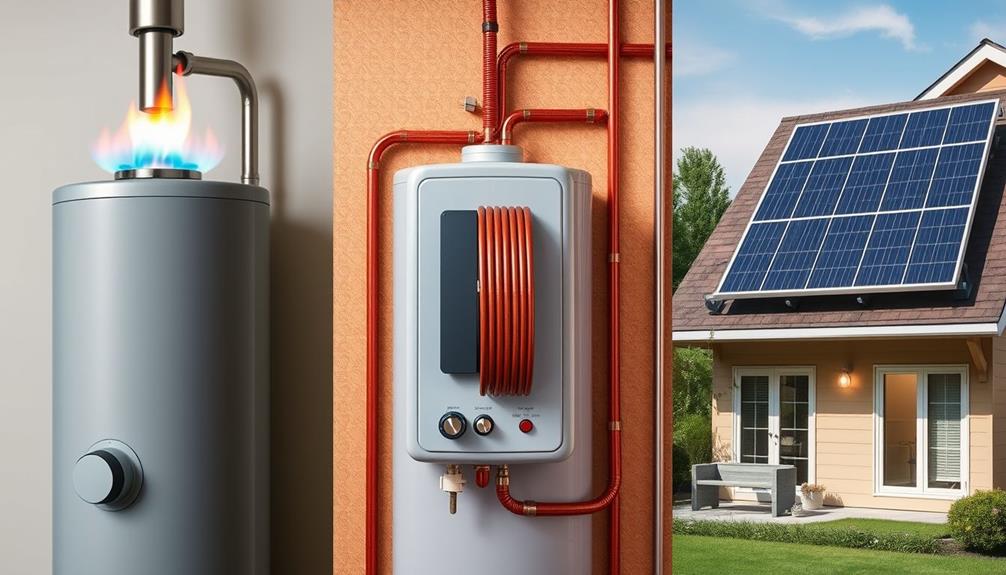
When it comes to selecting a water heater, the type of fuel you choose can greatly impact both performance and cost. You'll typically find two main fuel types: gas and electric.
If you have a small household, electric water heaters might be the more efficient option, although they do have a slower recovery rate. Additionally, evaluating your financial goals and budgeting for installation costs can be essential for making this decision.
On the other hand, gas water heaters heat water faster and are generally more energy-efficient for larger families, making them ideal for homes with high hot water demands investment considerations.
Installing gas water heaters may require a gas line, which can lead to higher initial costs. However, their ability to deliver hot water quickly often justifies the investment.
If you're considering a tankless model, both gas and electric options exist, but gas models usually provide higher flow rates and quicker heating capabilities.
Additionally, think about local fuel availability and prices, as these factors can greatly influence your ongoing energy bills. While gas often results in lower long-term operational costs, your choice should align with your household's needs and budget.
Evaluating Space Requirements

Selecting the right water heater isn't just about the fuel type; space considerations are equally important. You need to evaluate the installation space available in your home, as this can greatly influence your choice. Proper air quality is essential for a comfortable living environment, similar to how choosing the right size water heater enhances your home's functionality.
Here are a few things to keep in mind:
- Tank Water Heaters: These typically require 5-6 feet in height and 2-3 feet in diameter, demanding considerable floor space.
- Tankless Water Heaters: Compact and wall-mounted, they usually measure around 20 inches high, 14 inches wide, and less than 10 inches deep, fitting nicely in closets or utility rooms.
- Clearance Requirements: Don't forget the necessary 12 inches of clearance around the unit for maintenance and safety.
Additionally, consider the location of the water heater. It should be near the main water supply line to minimize hot water pipe lengths, which helps with efficiency and reduces heat loss.
If you're opting for a gas water heater, make sure there's adequate ventilation space around it, including specific distances from walls and ceilings.
Maintenance and Efficiency Tips
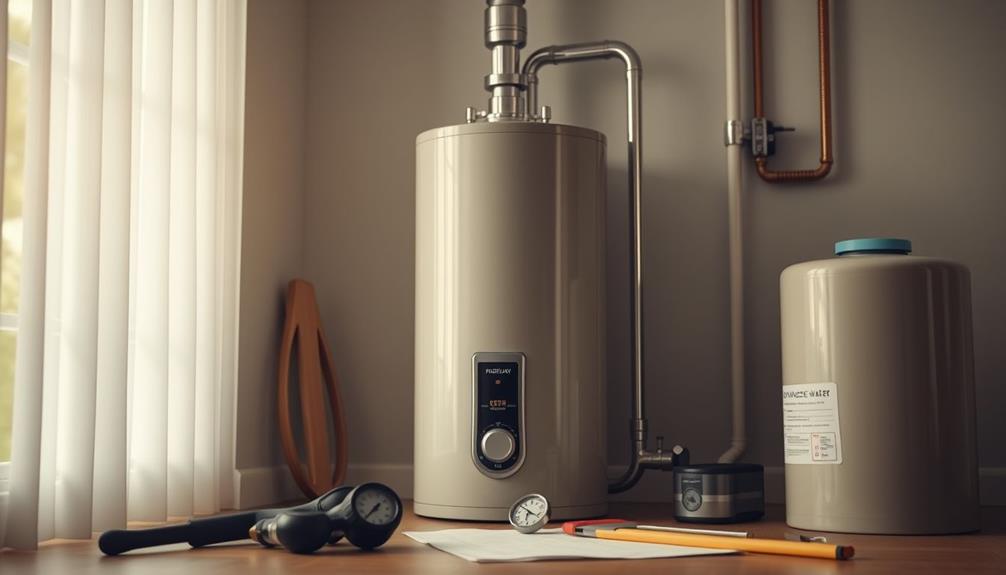
Maintaining your water heater is essential for ensuring its efficiency and longevity. By regularly draining your water heater at least once a year, you can remove sediment buildup that hampers performance. This simple maintenance task helps enhance efficiency and can extend the lifespan of your unit by preventing overheating.
Additionally, ensuring proper ventilation during use is vital, especially for gas water heaters that may otherwise pose safety risks when not maintained properly safety precautions necessary.
Additionally, check and replace the anode rod every few years. This important step prevents corrosion inside the tank, ensuring peak performance and longevity. Setting the thermostat to 120°F not only saves energy but also reduces the risk of scalding, while still providing enough hot water for your household needs.
Don't forget about insulating the first six feet of hot and cold water pipes connected to your water heater. This minimizes heat loss and greatly improves overall energy efficiency.
Frequently Asked Questions
How Do I Calculate What Size Water Heater I Need?
To calculate the size water heater you need, assess your household's peak hot water demand. Consider the total flow rate from all fixtures in use simultaneously, ensuring the heater meets or exceeds this requirement.
What Size Water Heater Do Most Homes Use?
Most homes typically use water heaters ranging from 23 to 80 gallons. For an average family of four, you'll likely need a 40-gallon tank to meet daily hot water demands effectively.
Is a 40 Gallon Water Heater Enough for a Family of Four?
Choosing a water heater's like picking a vessel for a journey. A 40-gallon heater might suffice for your family of four, but efficient habits and simultaneous usage could leave you stranded without hot water.
Is It Better to Get a Bigger Hot Water Heater?
Bigger hot water heaters can seem appealing, but they may lead to higher energy costs and waste. You need to evaluate your household's actual hot water usage before deciding if bigger's truly better for you.
Conclusion
So, you've navigated the watery world of water heaters and now you're ready to make a splash! Remember, choosing the right size isn't just about avoiding cold showers; it's about impressing your in-laws with your impeccable home decisions. Just think—while they're shivering in their half-filled tub, you'll be basking in the glory of your perfectly sized, efficient heater. So go ahead, size it up wisely, and make your home the envy of every frostbitten visitor!

